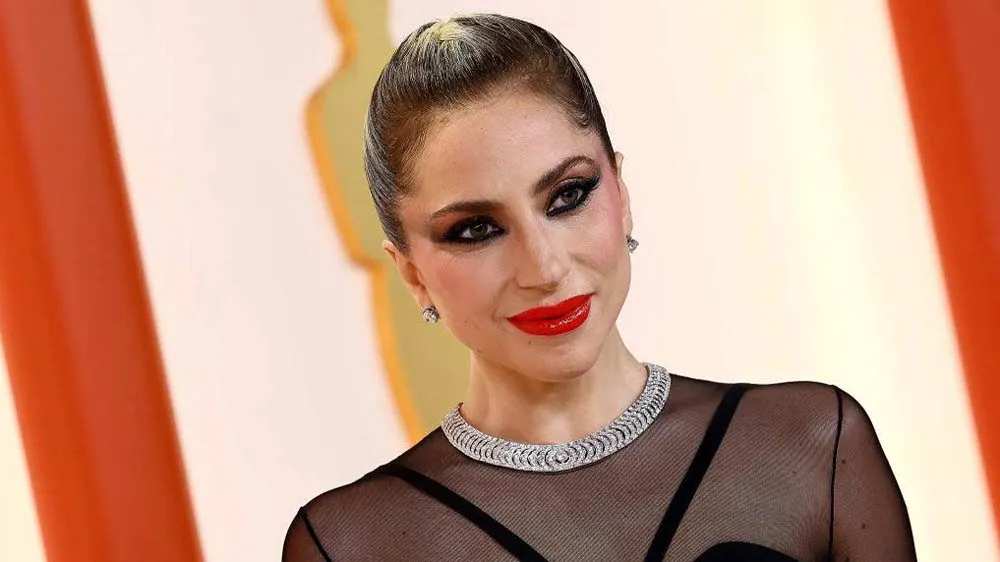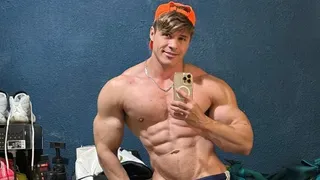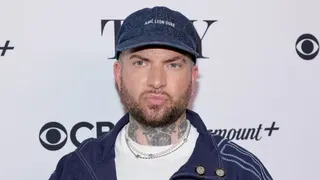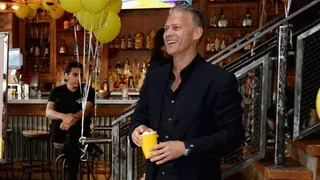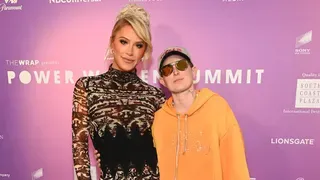March 10, 2021
Shira Helena Gitlin on SpeakEasy Stage Company's Production of 'The Pink Unicorn'
Kilian Melloy READ TIME: 11 MIN.
Elise Forier Edie's play "The Pink Unicorn" is a one-woman show in which plainspoken, God-fearing Texas native Trish recounts the tears, heartbreak, revelations, and laughter that come with having been told by her teenager, Jo, that they are a gender-neutral person – or, as Jo explains it, "I'm not a girl, Mama. Or, I'm not all girl. I'm a boy, too."
Trish explains and explores her personal turmoil, her transformative decision to support and protect her child, the pushback she encounters from her family, church, and community, and the discoveries that she makes while partnering with people from her town to defend the rights of both Jo and Jo's own newfound friends and allies.
Trish's fears and questions may well be shared by many who watch the SpeakEasy Stage Company's streaming production of the show, which runs March 5 through 18. In completely relatable, and sometimes bluntly forthright, terms, Trish (played by Stacy Fischer) paints a portrait of a woman whose world is changing – for the better, that is; changing into a world where her child can be safe, accepted, and loved.
Joining director M. Bevin O'Gara as Associate Director is Shira Helena Gitlin, a former fellow at Speakeasy Stage Company, and a non-binary theater artist who brings their perspective to the production. EDGE had the pleasure of a chat with Gitlin, who gave their thoughts on the issues addressed in the play, the diverse new vocabulary that the mainstream world is now starting to learn, and how our world, like that of Trish, is changing.
EDGE: You are the Associate Director for SpeakEasy Stage Company's production of "The Pink Unicorn." What does that mean, in this case?
Shira Helena Gitlin: I of course served as a second pair of eyes in the same way as an assistant director, but also brought a good amount of dramaturgical research, and a little more of a say when it came to making sure that the story of Jo was shining through while Trish told her own story, so we still had the perspective of the trans individual that the story is about, even though Jo is never actually on stage.
EDGE: Having been a fellow at SpeakEasy, were you one who said, "Look at this play, I think it would be interesting," or had they come to you because they knew you and wanted your input?
Shira Helena Gitlin: What actually happened was, I was supposed to assistant direct "Bright Star" last April, and unfortunately, of course, due to the great what-have-you, I was put on hold for that. Paul [Daigneault, SpeakEasy Stage Company's artistic director] emailed me at the very beginning of the process for "The Pink Unicorn," and asked me to assistant direct. After we read the play and started into pre-production, we realized that having someone who identifies as non-binary – which I do – on the team in a role that's a little larger would benefit the production a lot, because while the director, the playwright, and the main character are all cisgender women, that perspective, Paul and Bevin felt, was very important as well. Even though I was already signed on, they bumped that responsibility up a little.
EDGE: We've gotten to hear more about transgender people and their experiences in recent years, but there are still certain words and concepts around gender that people may not have heard of or understand, such as "gender nonconforming," "non-binary," "genderqueer," "gender literacy," and other terms that might be hard to parse. Could you say a little about what these terms mean, and what you might wish people knew about them?
Shira Helena Gitlin: I could write a whole book on that! You're absolutely right – it is a whole new world when it comes to knowledge on gender identity. It's a process of learning, and, to put it concisely, the gender binary that most folks grew up with and most folks were taught – that there are men and women – is something that's a very specifically Western colonial idea. It hasn't existed for all time, and I think it's something that everyone up to my generation grew up with, but the identities of gender-nonconforming people – so, people who fit outside those traditional roles of male and female, or outside those traditional perspectives – those have always existed. It's just that now, through media and through the Internet, those words are being solidified so that people actually have a way to represent themselves.
I sometimes hear people saying, "Well, people are putting themselves into boxes," but in fact the idea of non-binary gender and gender-nonconforming identities is that those boxes are being removed, so that people can live authentically.
EDGE: When my goddaughter came out as trans, it wasn't hard to adapt to referring to her as my goddaughter, but then she offered all sorts of other disclosures that were new – "pan romantic" was, I remember, a word I had never heard before. I think the best word I had at the time for her was, "Okay." Like, it's fine, and I'm glad to get to know the real you.
[Laughter]
Shira Helena Gitlin: Yeah, and I think that's part of it. There's a little of a generational divide sometimes, even more so as people find the words that work for them. Those words aren't necessarily in everyone's vocabulary, and it's a joint effort. I know I've done a lot of work in my life to make sure that the people around me know how to use the pronouns that I use, which are they/them. I know it was a process with family and with friends to make sure that they understood where I was coming from, but also that they understood it was a learning process for all of us, and for me as well. I didn't just wake up one day at 18 or 19 and say, "Oh, I think I'm non-binary." It was kind of a longer process over time of reflecting on gender identity and what that means to me, and what that means to the world. Overall, it's all about learning and growing. Even in the case of your goddaughter – that "okay" is the first step. That's what this play speaks to. Trisha's saying "Okay," and she has to figure out what's next.
EDGE: One of the things you did for the cast and crew of this production was assemble a resource list on the topic. Do you find that theater artists are a little more knowledgeable, or at least curious, when it comes to these issues than, say, the general public might be?
Shira Helena Gitlin: I think yes and no; being an artist and being in theater definitely does open people's eyes up to up and coming issues, whether it's about gender or race or class. I think theater has always tried to be on the forefront of current political movements and identity movements. But when it comes to the general pubic, it's mixed. For folks who had experience with trans individuals and with LGBT individuals in general, Sometimes, it leads to more education; but there are people out there, even in Boston, who have never, to their understanding, met a trans person, or even a gay person. Everyone is coming from a different place on that front, whether they're a theater maker or the audience.
EDGE: Theater, and any art, can promote social justice and show us perspectives we may never have been exposed to. Was that a major part of the attraction of theater for you?
Shira Helena Gitlin: It is now; I actually made my start in musical theater, which is so interesting, because looking at a lot of musicals through the lens that I do now, I see these longstanding issues of racism and homophobia, and whatever else was thrown into musicals in the 1950s. Musical theater is my love; having grown up with that perspective, now as a fully-formed adult I think that I'm absolutely interested in the social justice element of theater, the political element of theater. I use better words than that, too.
[Laughter]
Shira Helena Gitlin: I definitely find myself having gravitated toward that as I've gotten older.
EDGE: It's impossible for this play, and this subject matter, not to be political – at least, not in the current climate.
Shira Helena Gitlin: Absolutely, but what's political about it is not – or shouldn't be – the identities in the play. Instead, what we should be thinking about is the differences in our country [as a whole]. One of the really interesting things about this play is it takes place in Texas. Reading it, living in the Northeast, there's a part of me that was saying, "Do we need this up here?" I feel like I'm out at every place that I work; I live my life authentically. But I have that privilege to do that. In a lot of parts of the country trans people and non-binary people don't have that right, especially trans and non-binary people of color. And we see it right now with the confirmation hearings, where there's the first trans nominee [Dr. Rachel Levine, in Senate confirmation hearings] for Biden's cabinet, and the first thing I saw on the news for it was that one of the folks who was in the hearing [Sen. Rand Paul] went on a giant transphobic rant against them. You're right, there's no way it's not political – but only because we live in a country right now where people aren't allowed to live [as] their authentic selves and not be discriminated against for it.
EDGE: There is so much to love about Elise Forier Edie's script, so many great lines and insights. What you're just touched on is one of the play's principle messages, which is that certain people keep insisting on telling others who they are, rather than listening to them explain who they are. Why is it so hard for so many people to listen and accept that someone talking to them knows, better than they will, who they are?
Shira Helena Gitlin: That is an excellent question, and I don't truly know the answer to that, but speaking specifically to Trisha's story, it's really hard for parents to understand that their kids aren't necessarily going to be who they envision them to be. Trisha has this whole section where she talks about how she imagines Jo going to prom and wearing her grandmother's pearls, and all of that is so special and important to Trisha. But I think the stopgap is that moment when you have to understand that a child is their own person. And whether that means they dye their hair or get a piercing or get a tattoo, or it means their gender expression or identity is different than what you perceived it to be, I think that it's really hard to think that you know someone and then have them tell you something that either you didn't see, or that they didn't necessarily feel ready or comfortable to say [beforehand].
EDGE: One of the articles in the resource list your curated is a New York Times article by Dr. Paria Hassouri, who encourages parents of transgender and non-binary and gender-nonconforming children to "Be an optimist for your child." Did you experience that optimism from your own family?
Shira Helena Gitlin: It's been a growth journey for myself and my family. When I came out in 2013 there weren't [celebrities] who were trans; like, Laverne Cox hadn't really gotten big yet. There weren't trans people out there living their lives [in the public eye]. Now, we have people like Elliot Page, who uses they and he pronouns. We have plenty of musicians, artists, and actors who are trans or gender non-conforming who have made it on these big shows, on Netflix and other streaming sites. I had a great conversation with my mom after she watched "Pose" for the first time. That kind of media has really opened the eyes of my parents, and the parents of many, many people to the fact that we're not alone.
I think that's the scariest thing: When you think that your child is alone, or is going to face discrimination. That's a fear that every parent has. I know my parents had that worry with me, and it's been a long process for them to understand why I've made my decisions to live my life authentically, but I know that they love me and accept me for who I am, and they've made that very clear throughout the whole process, so I've been very, very lucky on that front.
EDGE: You are going to be participating in [Women's Theatre Festival's] WTFringe Festival 2021. What project are you planning for the Festival?
Shira Helena Gitlin: So the way the festival works, it's a class and also a fringe festival. Every Wednesday I'm part of a directing cohort. We're talking a lot about theater, and the future of theater, and about different directing techniques; we'll talk about things like anti-racism and feminist-themed theater. Eventually, what we're going to be doing is, there's a directing cohort, and acting cohort, and a streaming cohort, and we're going to be working together to put on a big online festival.
They selected us early on so that we could go through this whole process together, which mirrors a lot of [in-person] programs that don't exist right now, so I'm very grateful for that connection and community I have right now through that.
EDGE: The future is still nebulous, of course, but are there other projects you have coming up?
Shira Helena Gitlin: I've been working with Andrew Childs, who's another Boston director, and we've been collaborating on different programs to try to get young emerging theater artists together online. We did a Valentine's Day mixer and we've started holding Trivia Night. I've been excited about that because I moved here in September 2019, and I worked for SpeakEasy until COVID hit last year. I got to start meeting people, but now I feel I have actually joined the community and found so many great opportunities and wonderful people there. I'm still in that juicy networking phase that comes before the projects.
"The Pink Unicorn" streams through March 18. For more information, go to https://www.speakeasystage.com/pink-unicorn/. CONTENT ADVISORY: In telling this story, this play contains multiple instances of transphobia and misgendering as well as ableist and fat phobic language..
Also, SpeakEasy will be hosting the sixth series of its Play Discussion Club, which will take place on three successive Thursdays. March 11: MJ Kaufman's "Sensitive Guys"; March 18, M Sloth Levine's "The Interrobangers"; and March 25, Ty Defoe's "Firebird Tattoo." For more information on the Play Discussion Club, go to https://www.speakeasystage.com/play-discussion-club.
Kilian Melloy serves as EDGE Media Network's Associate Arts Editor and Staff Contributor. His professional memberships include the National Lesbian & Gay Journalists Association, the Boston Online Film Critics Association, The Gay and Lesbian Entertainment Critics Association, and the Boston Theater Critics Association's Elliot Norton Awards Committee.
